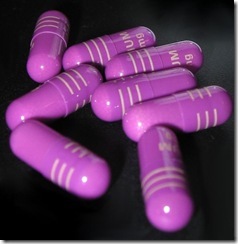Nexium was approved in February 2001 as the fifth member of the proton pump inhibitor (PPI) family of drugs. These drugs are approved for short-term treatment of gastroesophageal reflux disease (GERD) and most are also approved for duodenal and stomach ulcers resistant to treatment with histamine2-blockers and antacids. Most of the PPIs are also used in combination with antibiotics to treat ulcer disease caused by the bacterium Helicobacter pylori (see Ulcers and Gastroesopageal Reflux Disease (GERD)). Most studies do not show a significant difference between the different PPIs for the treatment of GERD, duodenal ulcer, or Heliocobacter pylori. PPIs inhibit the secretion of stomach acid, whereas histamine2-blockers partially prevent production of acid.
Nexium was approved by the Food and Drug Administration (FDA) in 2006 for the treatment of Zollinger-Ellison Syndrome, a rare hormonal disorder characterized by excessive stomach acid production due to tumors in the duodenum or pancreas. PPIs, including Nexium, do not affect the tumors involved in Zollinger-Ellison Syndrome, but reduce the acid secretion, thereby relieving symptoms and promoting healing of the ulcers.
In fact, patients who have been taking Prilosec (Omephazole) since it was approved in 1989 have been getting Nexium with each dose. Like many drugs, Prilosec is a mixture of two forms that are chemically identical but are “mirror images” of each other. These mirror images are called optical isomers, and Nexium is one of the two that make up omeprazole. Nexium and Prilosec are both produced by the same company, AstraZeneca Pharmaceuticals.
In its application for marketing to the FDA, AstraZeneca claimed that Nexium had important advantages over omeprazole. An FDA Medical Officer was charged with reviewing the veracity of this claim. FDA reviews can be very different from the image that drug companies try to portray about their new drugs because the agency has access to research data that may never be published if it is not in the economic interests of the company. The Medical Officer stated:
The sponsor’s [AstraZeneca’s] conclusion that H 199/18 [Nexium] has been shown to provide a significant clinical advance over Prilosec in the first-line treatment of patients with acid-related disorders is not supported by data [emphasis in original].
...Specifically, there are [sic] no scientific basis for the sponsor’s statement that compared to omeprazole, H 199/18 offers a faster and improved resolution of heartburn symptoms and higher rates of healing in the treatment of erosive esophagitis. The two compounds are comparable in their efficacy for this indication.
The Medical Officer’s final recommendation on Nexium was equally clear:
In addition, it is recommended not to allow the sponsor [AstraZeneca] to claim that Nexium magnesium has any significant clinical advantage over Prilosec in the first-line treatment of these acid-related disorders because no data in support of such a claim have been submitted.
Why would an industry that claims it is so innovative engage in such tactics? Prilosec was about to lose its patent protection. The most expedient strategy for AstraZeneca to protect its lucrative share of the PPI market was thus for the company to develop Nexium, a drug that would have patent protection even though it is clearly not an innovation that required much scientific ingenuity, and then get physicians to switch their Prilosec patients to Nexium. The result: AstraZeneca revenues stay up, the price of drugs increases, and  patients derive no clinical benefit whatsoever.
patients derive no clinical benefit whatsoever.
We have listed Nexium as a Do Not Use drug rather than a Do Not Use Until Seven Years After Release drug not because of safety and effectiveness concerns but because there is no significant difference between this drug and omeprazole. Switching from omeprazole, which is available generically, to Nexium will cause the health care system economic harm. Patients with poor or nonexistent drug coverage will foot the bill that ensues from doctors being conned into prescribing Nexium. However, we acknowledge that particular health insurance plans may reimburse for Nexium and not some other PPIs that have longer track records.
Post-marketing reports of myalgia (pain in a muscle) and hepatitis with or without jaundice (liver inflammation with or without the yellowing of the skin and eyes) were reported (very rarely) with the use of Nexium.
Technorati tags: ![]() Nexium
Nexium ![]() FDA
FDA ![]() Prilosec
Prilosec ![]() AstraZeneca
AstraZeneca
No comments:
Post a Comment